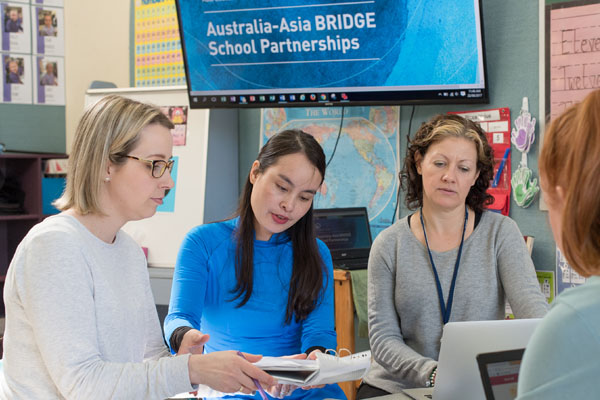by
User Not Found
| Aug 30, 2017
Kathe Kirby, Executive Director, Asia Education Foundation

Australia’s Department of Foreign Affairs and Trade (DFAT) is developing a new White Paper to shape Australia’s foreign policy for the next decade. Earlier this year the Asia Education Foundation convened an impressive group of Australia’s school education leaders to join an Asialink national consultation to discuss what they wanted to see in a new foreign policy for Australia.
The group strongly agreed that young Australians are the key national resource to secure Australia’s place in the world.
Therefore, they must have confidence and comfort in dealing with globalization and not be scared by it. The ‘new work order’ resulting from globalisation combined with the power of new communication technologies, demands that young Australians have intercultural understanding, enterprise skills, creativity, critical thinking, digital capability and that they speak the world’s languages. They will need knowledge, skills - and values like ethical understanding, empathy and fairness - to collaborate with other countries to resolve the big pressing issues of our times like sustainability, security and equality. Importantly, young Australians represent how we are seen as a nation - how we embrace cultural diversity and value respect and inclusivity.
It is therefore in Australia’s best national interest that our schools are equipping all students to be curious about the world, to develop a global mindset, to know our region and to gain the capabilities to understand and navigate a diverse and increasingly uncertain world.
The group was clear: schools cannot achieve this by themselves. Australia’s school educators want our Foreign Policy to provide a national vision of Australia’s place in the world to provide a clear policy context for their work.
They also agreed that school educators and students should be much better mobilised as powerful diplomats for Australia. Principals, teachers and students can contribute to, and benefit from, inclusion in our international engagement and that needs to be clear in the White Paper.
We need to be serious about this. We have known for a long time what is required to support international engagement in schools but have had too little sustained bi-partisan commitment to see it happen at scale.
In addition to the discussion of mainstream school education in Australia, the School Education group discussed the fact that Australia’s international education industry is recognised as one of the five super growth sectors contributing to Australia’s transition from a resources-based to a modern services economy.
International education in schools offers an unprecedented opportunity for Australia to capitalise on increasing global demand for education services. Schools have a vital role to play in expanding Australia’s international education market and through that to strengthen our economy, our relationships and our communities.
In summing up the discussion, school educators made three strong recommendations to DFAT. Our next Foreign Policy needs to:
- include an objective to equip young Australians to engage effectively with the world
- provide strategies to broaden and strengthen the diplomatic role that the Australian school education sector plays in global communities; and
- promote the economic benefits to Australia from the school education sector.
A global skill set and mindset for all young Australians is the best foundation we can build to ensure that Australia’s Foreign Policy objectives can be achieved.
To read Asialink’s complete submission to the Foreign Policy White Paper click here.
For more details on the Australian Government’s Foreign Policy White Paper click here.
Comment